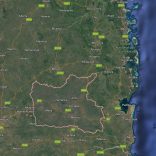Mozambique: ‘Anibalzinho’ freed after serving full sentence in journalist Carlos Cardoso murder ...
Water restrictions in Greater Maputo relaxed

in file CoM
The Mozambican authorities on Thursday announced a relaxation in the water supply restrictions in the Greater Maputo area.
Maputo, the neighbouring city of Matola and Boane district are heavily reliant for their water on the reservoir behind the Pequenos Libombos dam. But for the past five years the level of water in the reservoir has been at worryingly low levels.
The water from the Pequenos Libombos flows into the Umbeluzi river, on which stands the treatment station which provides clean water for the Greater Maputo Metropolitan Area.
When the 2018-19 rainy season began last October, the Pequenos Libombos reservoir was just 25 per cent full – equivalent to 97 million cubic metres. But the rainy season brought little relief – indeed rainfall was so poor in Maputo province in late 2018 that by January 2019 the storage level in the reservoir had fallen to just 20 per cent.
Water was pumped to Maputo and Matola for just six hours a day. But now, according to the National Director of Water Resource Management, Messias Macie, speaking at a Maputo press conference, water will be supplied 15 hours or more a day.
What has made this possible is the agreement reached when President Filipe Nyusi visited Eswatini (formerly Swaziland) in March. He persuaded the Swazi authorities to release more water into the Mozambican part of the Umbeluzi basin, over and above the agreement between the two countries on sharing the basin.
This has allowed the amount of water stored in the Pequenos Libombos reservoir to rise to 122 million cubic metres – or 32 per cent of its capacity.
Macie said this was enough to allow an increase in the discharges from the dam, as from Thursday, to 2.65 cubic metres a second, providing enough water for the Umbeluzi treatment station to operate at full capacity
Not only will more water reach the taps of urban consumers, but the restrictions on the use of Umbeluzi water for agriculture have also been relaxed. Macie said that 0.3 cubic metres a second is now available for agriculture “which will be a relief for our colleagues producing various crops in that region of the Umbeluzi Basin”.












Leave a Reply
Be the First to Comment!
You must be logged in to post a comment.
You must be logged in to post a comment.